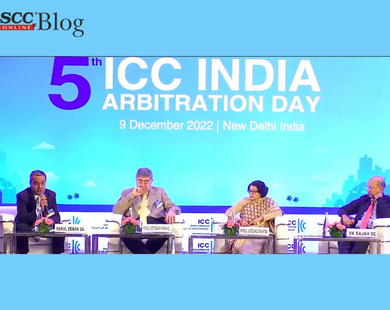5th ICC India Arbitration Day was held on 09-12-2022 at Hyatt Regency, Delhi. The event was sponsored by Clifford Chance, SCC Online, JSA, Khaitan & Co, Trilegal, Jus Mundi, FTI Consulting, Rajah & Tann Asia, Jones Day.
The event saw the presence of Claudia Salomon, President, ICC International Court of Arbitration, Alexander Fessas, Secretary General, ICC International Court of Arbitration, Justice Sanjay Kishan Kaul, Judge Supreme Court of India, Justice Indu Malhotra, Former Judge, Supreme Court of India, Justice Rajiv Shakdher, Judge, Delhi High Court, V.K. Rajah, Senior Counsel, Former Attorney General, Judge of Appeal, Singapore and Arbitrator and Mediator, Duxton Hill Chambers; Vice President, ICC International Court of Arbitration and many more.
The program began with a welcome address by Mr. Tejus Chauhan, Director, South Asia, ICC International Court of Arbitration and was followed by the opening remarks of Mr. Alexander Fessas, Secretary General, ICC International Court of Arbitration who referred to the effects of COVID-19 pandemic at geo-political scale, global economy, regional economy, which in return affected the world of disputes. He stated that the ICC’s mission is to make businesses work for everyone, everywhere, every day. He also discussed the instances where disputes arise in commercial context. He pressed on the need to have a good, healthy and institutionalised arbitration upon which parties can put in their trust in 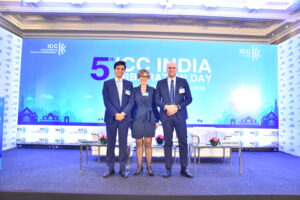 the system and said that ICC Court ensures a healthy award being rendered through its careful review in terms of validity and enforceability.
the system and said that ICC Court ensures a healthy award being rendered through its careful review in terms of validity and enforceability.
ADDRESS BY CLAUDIA SALOMON, PRESIDENT, ICC INTERNATIONAL COURT OF ARBITRATION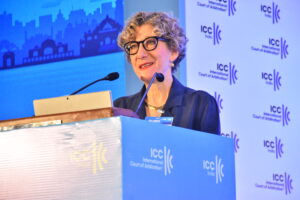
The event progressed with the President’s Address, Claudia Salomon where she discussed the agendas of ICC and how ICC is focusing on the needs of business in India, understanding the need in Indian legal system and enforcing the awards, keeping an Indian perspective in mind. She further went on to explain the difficulty that Arbitrators may face during the process. She discussed the issue when parties only speak from their own point of view and avoid addressing each other, that process is called ‘ships passing in the night’ which is most dreaded by the Arbitrator. The ‘ships passing in the night’ create a delay in deliberations because the Tribunal need to get an additional submission from the parties which puts a hinderance in achieving an effective resolution.
PANEL DISCUSSION 1:
The event was followed by a panel discussion on landmark arbitration decisions of India. The speakers presented summaries and case commentaries of selected landmark decisions pertaining to arbitration, which was moderated by 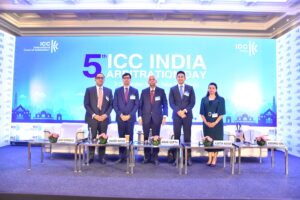 Amar Gupta, Partner, J. Sagar Associates, New Delhi. The speakers identified key findings in cases related to unilateral appointment of Arbitrator and its retrospective application in Perkins Eastman Architects DPC v HSCC (India) Ltd. (2020) 20 SCC 760 and various judgements of the Delhi High Court which dealt with this issue. They further went on to talk about sovereign immunity in execution of arbitral award in KLA Construction Technologies Pvt. Ltd v Embassy of Islamic Republic of Afghanistan, 2021 SCC OnLine Del 3424. They also spoke about jurisdiction under Section 34 referring to The Project Director NHAI v. Hakeem (2021) 9 SCC 1 and concluded with the importance of ‘seat and law of arbitration’ in Enka v Chubb (2020) UKSC 38.
Amar Gupta, Partner, J. Sagar Associates, New Delhi. The speakers identified key findings in cases related to unilateral appointment of Arbitrator and its retrospective application in Perkins Eastman Architects DPC v HSCC (India) Ltd. (2020) 20 SCC 760 and various judgements of the Delhi High Court which dealt with this issue. They further went on to talk about sovereign immunity in execution of arbitral award in KLA Construction Technologies Pvt. Ltd v Embassy of Islamic Republic of Afghanistan, 2021 SCC OnLine Del 3424. They also spoke about jurisdiction under Section 34 referring to The Project Director NHAI v. Hakeem (2021) 9 SCC 1 and concluded with the importance of ‘seat and law of arbitration’ in Enka v Chubb (2020) UKSC 38.
PANEL DISCUSSION 2:
After the address of the first panellist, the forum was taken over by Mr Kabir Singh, Partner, Clifford Chance, Singapore; 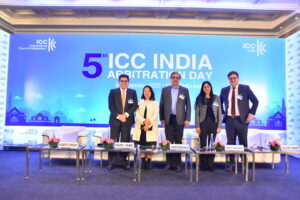 Member, ICC International Court of Arbitration who moderated the second set of panellists exploring the topic of ‘how role of clients, legal representatives and arbitral institution should align to achieve time and cost-effective arbitral proceedings. They went on to emphasise on the fact that the importance of synergy between those involved in arbitration which highly influences decision making may often be overlooked. The panel identified pitfalls and debunked misconceptions concerning cooperation and procedural compliance among them when dealing with arbitration. The Panel also shared practical tips on how to manage different types of arbitration as clients and representatives, and insights into the working of the arbitral institution.
Member, ICC International Court of Arbitration who moderated the second set of panellists exploring the topic of ‘how role of clients, legal representatives and arbitral institution should align to achieve time and cost-effective arbitral proceedings. They went on to emphasise on the fact that the importance of synergy between those involved in arbitration which highly influences decision making may often be overlooked. The panel identified pitfalls and debunked misconceptions concerning cooperation and procedural compliance among them when dealing with arbitration. The Panel also shared practical tips on how to manage different types of arbitration as clients and representatives, and insights into the working of the arbitral institution.
PANEL DISCUSSION 3:
The third set of panellists was led by Shaneen Parikh, Partner (Head- International Arbitration), Cyril Amarchand 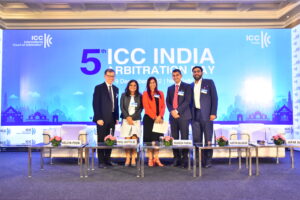 Mangaldas exploring the current landscape of construction and energy arbitration. They spoke about how the construction sector in India saw an exponential growth which in turn became a sector of immense disputes. Issues such as ‘force majeure’ and ‘project delays’ continues to be seen. The Panel navigated through the key and topical issues while dealing with construction arbitration in the past few years and shared their views as to what the relevant stakeholders could understand better to mitigate risks.
Mangaldas exploring the current landscape of construction and energy arbitration. They spoke about how the construction sector in India saw an exponential growth which in turn became a sector of immense disputes. Issues such as ‘force majeure’ and ‘project delays’ continues to be seen. The Panel navigated through the key and topical issues while dealing with construction arbitration in the past few years and shared their views as to what the relevant stakeholders could understand better to mitigate risks.
PANEL DISCUSSION 4:
In conversation with Justice Sanjay Kishan Kaul, Justice Indu Malhotra and V.K. Rajah SC, they took us through the Indian arbitration ecosystem which was moderated by Nakul Dewan Senior Advocate & Barrister, Twenty Essex Chambers, Singapore, Delhi & London. Since the last 10 years, India has emerged as a developing jurisdiction with the pro-arbitration stance which aligns with the country’s reputation as an emerging market powerhouse with trade and business in and out from India for which disputes and are, at times, unavoidable. Considering the current global economic outlook and the way it influences the arbitration ecosystem, India may benefit and be inspired by the success story of its economic partners, such as Singapore, that manages to strengthen its economy back following the pandemic and how the country’s arbitration ecosystem is an integral part of Singapore’s economic backbone. 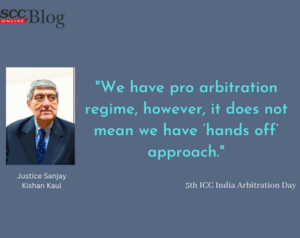
Justice Indu Malhotra asserted that
“In so far as India is concerned, it was in 2015 that the major development in India’s arbitration landscape took place, where there were series of amendments brought about in Arbitration Act. There were Commercial Courts which were set up under the Commercial Courts Act, 2015 followed by the Insolvency and Bankruptcy Code, 2016, which set the climate for foreign investment to come in. There was a huge inflow of Foreign Direct Investment post 2015; statistics which has been recorded by the World Bank. Sound adjudicatory framework is certainly a necessary step for a better inflow of Foreign Trade, Foreign Investment, growth and development of a Country. Legislative amendments and the pro-arbitration approach has made a 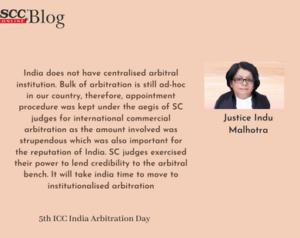 huge difference in the last 10 years”
huge difference in the last 10 years”
“District Courts go wrong on the scope of jurisdiction” says Justice Indu Malhotra.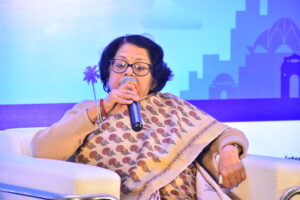
“It is understood in the context, that there can always be two views to dispute. Unlike litigation, arbitrator is the chosen  judge, where you choose somebody to resolve the dispute. Therefore, it is advised that one should abide by what he/she says. In only a rare case, Supreme Court should intervene in an arbitral award. Otherwise, we end up creating a jurisdiction for appeal, in contrast to the very concept of quick remedy, which is the sole purpose of arbitration.”, said Justice Sanjay Kishan Kaul.
judge, where you choose somebody to resolve the dispute. Therefore, it is advised that one should abide by what he/she says. In only a rare case, Supreme Court should intervene in an arbitral award. Otherwise, we end up creating a jurisdiction for appeal, in contrast to the very concept of quick remedy, which is the sole purpose of arbitration.”, said Justice Sanjay Kishan Kaul.
V.K. Rajah Senior Counsel further went on to emphasise on how critical, it is to create a credible ecosystem and judiciary on whom parties believe that wrong can be righted among those who participate in arbitral process which is essential for a seat to be respected. That there is a belief by those who chose the seat, that in case something goes wrong, the parties shall receive a fair and efficient Court supervising the problem.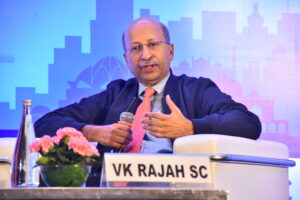
“India does not have a real voice in International Arbitral Institutions” says VK Rajah SC, Former Attorney General.
VALEDICTORY ADDRESS:
In the valedictory address, Justice Rajiv Shakhder, in concluding remarks, went on to explain why it is important for India to have such alternative dispute initiatives taking a firm root. Referring to a NALSAR report, he stated that India has about 860 Alternative Dispute Redressal (‘ADR’) centres which deal with arbitration, mediation and conciliation. In a country like India, there is a need to progress and increase these centres as it has more that 600 districts in the country and having such smaller number of ADR centres is not sufficient.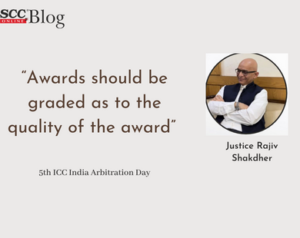
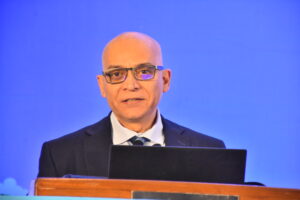 “It is always a good idea to have a session on mediation and conciliation” says Justice Shakdher.
“It is always a good idea to have a session on mediation and conciliation” says Justice Shakdher.
“India not only needs to concentrate on Commercial and Construction Arbitration but also requires looking into low value matters as such matters clog the litigating Courts”.
This is a great gripe for arbitration system i.e., to increase the centres. Instead of just concentrating at commercial and construction arbitration, we also require looking into low value disputes involving family matters, property matters etc as these issues clog the litigating Courts.
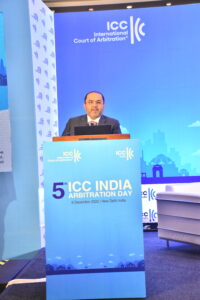
The event was concluded by Kunal Vajani, Head of Chambers – BlackRobe Chambers | Of Counsel – Fox & Mandal, New Delhi; Member, ICC International Court of Arbitration.
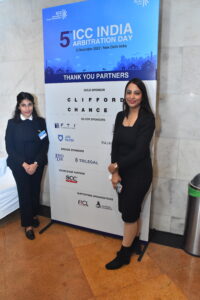
SCC Online Team: Bhumika Indulia, Associate Editor, EBC Publishing alongwith Simran Singh, Editorial Assistant attended the event.


